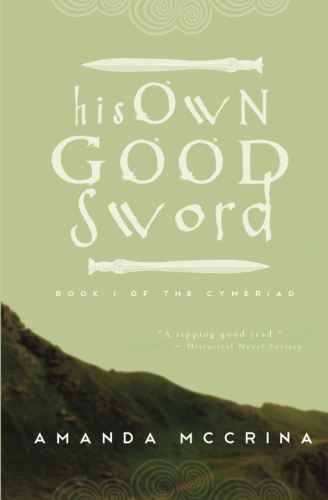Background
Cymeria, the setting of His Own Good Sword, is a fantasy world inspired by real-world historical cultures. Varen, the imperial power that dominates Cymeria, is modeled upon ancient Rome, while the province of Cesin shares many similarities with Roman-occupied Wales—an isolated, troublesome border province, never completely subjugated, comprised of diverse tribal groups that must come together in the face of oppression. But neither place should be read as an exact allegory. I took a lot of liberties with real history in creating Cymeria, sometimes for simplicity’s sake—the Vareno political and military systems are a lot more straightforward than the Roman systems were in reality, for example—and sometimes simply for my own selfish creative purposes. Cymeria is meant to evoke rather than precisely capture a certain historical period. All inconsistencies, therefore, are very much my fault.
Language note
Vareno is based loosely—read lazily—on modern Italian. Typically, -o is the masculine noun/adjective ending, -a the feminine, while -e can be either masculine (Tore) or feminine (Challe). Plurals are formed by changing the final vowel to i (for words that end in vowels: Risti) or by tacking i onto the end of words that end in consonants: Cesini. This is the same for masculine and feminine words.
Pronunciation guide
In Vareno, a is pronounced as in the English ‘father.’ E is short, as in the English ‘pen,’ except when it appears at the end of the word; it then makes the English long ‘a’ sound (there are no silent letters in Vareno; e is sounded out in words like Vione and Sarre). The i sound is the English long ‘e,’ except when followed directly by double consonants; in Risto, the i makes the short sound—English ‘pit.’ Y makes the English long ‘e’ sound when followed by another vowel (Tyren) but otherwise (Magryn) makes the short ‘i’ sound.
Æ, as in Chælor or Mægo, makes the long ‘a’ sound. C, as in Cesin or Carent, produces the English ‘ch’ sound (‘church’), while ch—Chæla, Choiro—produces the English ‘k’ sound.
Character guide
In Vessy, capital of the Imperial Province of Cesin:
- Tyren Risto, nineteen years old as the story opens, has just received his first commission as an officer in the Imperial army: he’s to take command of the garrison at Souvin, a tiny mountain village that has been a hotbed for native rebellions against the Empire. Tyren is the second and younger son of . . .
- Torien Risto, the provincial governor. A former soldier and war hero, Torien took up the duties of governor after the mysterious deaths of his father and older brother twenty years ago. He’s married to Chæla Ceno, a Choiro socialite, with whom he has three children. He’s never been comfortable playing the part of a politician, or very adept at it, much to the exasperation of . . .
- Tore Risto, his older son and heir. Newly married to Juile Ordano, the daughter of a prominent Choiro family, Tore is highly conscious that his father’s long-held grudge against the powerful Marro family could have devastating political results. He’s likewise aware of the growing political importance of . . .
- Challe Risto, Torien’s daughter, who will soon be of marriageable age herself.
- Sere Moien is captain of the household guard, Torien’s long-time best friend, and one of the very few people Torien trusts unreservedly. They served together in the army before Torien became governor.
- Anno Rovero, the steward, has some political ambitions of his own.
In Rien, an important fort town in central Cesin:
- It’s no secret that Lucho Marro, the regional governor, enjoys the favor of the Emperor, and therefore no surprise that . . .
- Luchian Marro, his youngest son and a skilled swordsman, has just been given command of a unit of the Imperial Guard, the elite, pure-blooded arm of the Imperial military.
- Recho Seian, Luchian’s brother-in-law and adjutant, is biding his time and planning his own bid for power.
- Marchin Ruso, commander of the Rien fort, has long been in Lucho’s pay, a fact not lost on . . .
- Alluin Senna, a Senate-appointed Imperial legate, who’s in Rien to inspect the garrison.
In Souvin, a remote village in western Cesin:
- Lieutenant Remin Verio has had command of the garrison for two months, and is none too happy to be replaced by an inexperienced whelp fresh from the parade grounds.
- Corporal Revyn Aino is knowledgeable, competent, and quiet. He’s also native-born, and some would say that makes him untrustworthy, but Tyren comes to consider him invaluable.
- Bryo Muryn claims he’s nothing but a native farmer, but Tyren can’t shake the feeling there’s more to him than that.
- Maryna Nyre, the sharp-tongued village healer, makes no attempt to hide her hatred for the Empire, or her love for . . .
- Mægo Sarre, leader of a rapidly-spreading native rebellion, who holds a bitter grudge against the Empire in general and against Tyren in particular.
- Ryn Magryn, the young native lord, must make his own choice between Empire and rebellion, knowing either choice will most likely end in death.
- Commander Maurien Rægo, sent to help finish the Empire’s work in Souvin, is confident he can handle the task . . .
- Though his adjutant, Lieutenant Jure Daien, isn’t so sure.
In Choiro, the Imperial capital:
- The Emperor Berion’s close ties to the Marro family have far greater and graver implications than the Senate suspects.
- Commander Chion Mureno finds that doing his duty for the Empire comes at the cost of an old friendship.
- Chæso Rano, head of the highly-respected Rano family, is all too aware the Risti have fallen from Imperial favor of late, and is determined not to join them.
Elsewhere:
- Juilin Viere, the newly-appointed governor of a remote region of Cesin, is rudely awakened to the fact that neutrality is no longer an option.

 I'm a student, amateur historian, coffee connoisseur, movie buff, hockey fan, cat lady, and all-around nerd. I'm currently pursuing a degree in history and political science at the University of West Georgia. In my spare time, I write historical fiction and fantasy. My debut YA historical fantasy novel His Own Good Sword was released on 7 May 2013.
I'm a student, amateur historian, coffee connoisseur, movie buff, hockey fan, cat lady, and all-around nerd. I'm currently pursuing a degree in history and political science at the University of West Georgia. In my spare time, I write historical fiction and fantasy. My debut YA historical fantasy novel His Own Good Sword was released on 7 May 2013.


